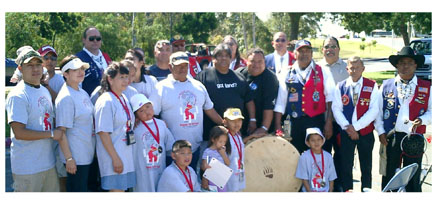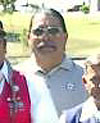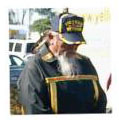

By Roy Cook
Gods and animals ran long before Indian Men and women did. Thereafter the Gods told the people to run and the animals showed them how. In practically every tribe’s oral history, running stories instructed and entertained. In California oral history the Sun once ran. When coyote beat the Sun the world became dark until wood duck revived the Sun and brought us into a new age of enlightenment.
This is the tenth and final year for the red road run. Our Native American Veterans and Warriors is the theme. Honored guests are the Piestewa family from the Hopi Mesas by way of Tuba city.

Red
Road Run origin as related by Joe Luna, "The Red Road is the 1994 idea of five
core members of the Native Americans Council: Lucinda Millar, Joe Luna, Charlene
Krusas. Kitty Luna and Eric Running Path." Eric has run the race each year with
the children and he was present to address the audience and award recognition
to the winners. This event is the culmination of a decade of tradition for the
current Native American Council Red Road organizers: Joe Luna, Charlene Krusas,
Karen Elfaln, Leslie Wade, Monica Keller, Randy Bordeaux, Roberta Keller, Alex
Martinez, Eleanor Miller and Vickie Gambala.
Native Americans Council members donate their time to various projects and committees. Their main areas of support are to: Education, cultural awareness, athletics and health. This year the Council is very honored to host the Piestewa family to this event.
Billy Mills was one of
the major world-class celebrities and run participants in the early Running
the Red Road events. Born June 30, 1938 in Pine Ridge, South Dakota, Billy Mills
is an Oglala Sioux Indian. His Native American name is Loves His Country. Mills
grew up on the Pine Ridge Oglala Sioux Indian reservation and was orphaned at
the age of 12. He attended Haskell Institute Indian School and the University
of Kansas.
While serving
in the Marine Corps, he returned to racing, posting times that were good enough
to qualify him for the 1964 Olympics in Tokyo. In an exciting, come from behind
finish he won the gold metal. This 1964 victory inspired the film, Running Brave.
To date, no other American has won a gold medal in the 10,000 meters.
After the Olympics,
Mills went on to set several other records in distance running before retiring
from competition. In 1965, he set an outdoor world record in the six mile run,
along with U.S. records in the 10,000 meter and three mile races. He remains
active in Native American causes today. "Your life is a gift from the Creator.
Your gift back to the Creator is what you do with your life." -- Billy Mills
Billy lives his life
through the teachings of his father. "I was constantly told and challenged to
live my life as a warrior. As a warrior, you assume responsibility for yourself.
The warrior humbles himself. And the warrior learns the power of giving."


![]() The
Red Road Run Indian Council is honored to recognize California Indian Tribal
Warriors. Santa Ysabel enrolled warrior, Ron Chrisman, U. S. Army 82nd
Airborne 504th Combat Engineer. Ron is a Vietnam veteran and resident
of the Viejas reservation. He provided outstanding support to the event: Blessing
of the runners at the beginning, and Northern singer with the Dancing Cloud
drum. Jamul
Indian village former Chairperson, Kenny Meza USMC Vietnam veteran accepted
the Indian Council recognition of his support as a Tribal leader and warrior.
The
Red Road Run Indian Council is honored to recognize California Indian Tribal
Warriors. Santa Ysabel enrolled warrior, Ron Chrisman, U. S. Army 82nd
Airborne 504th Combat Engineer. Ron is a Vietnam veteran and resident
of the Viejas reservation. He provided outstanding support to the event: Blessing
of the runners at the beginning, and Northern singer with the Dancing Cloud
drum. Jamul
Indian village former Chairperson, Kenny Meza USMC Vietnam veteran accepted
the Indian Council recognition of his support as a Tribal leader and warrior.
This event is a tribute to our fallen Warrior: Army PFC Lori Ann Piestewa. She was killed in combat when her support convoy, Army 507th Maintenance Company, was ambushed near Nasiriyah, Iraq. Piestewa, 23, was the mother of two young children, and her death again raised the question of the role of women in combat. While in Iraq, reports say when their Humvee transport broke down, the team made quick repairs and were on their way to Nasiriyah when they made a wrong turn and were ambushed. While Lynch was injured and captured, later to be the subject of a reported daring rescue, it is unclear how Lori Piestewa died. For American Indians, there are times when their culture runs opposite to the mainstream. Carla is Lori's 3-year-old daughter. She said her mother came to her after her death and told her young daughter she wasn't coming home. In the visitation, Carla apparently was told about the ambush. Carla's question is why did "they" shot her mother. Carla and her brother, Brandon, 4, both Hopi-Navajo have lived with their Hopi grandparents, Terry and Percy, since Lori enlisted in the United States Army. Through generations of intermarriage, the Piestewa family represents several of those cultures. The late soldier was a Hopi with some Navajo heritage, the granddaughter of a Hispanic immigrant and a practicing Roman Catholic. Her 4-year-old son Brandon and her 3-year-old daughter Carla were baptized at St. Jude's Roman Catholic Church in Flagstaff, AZ. The children presently live with their grandparents in Tuba city, AZ.